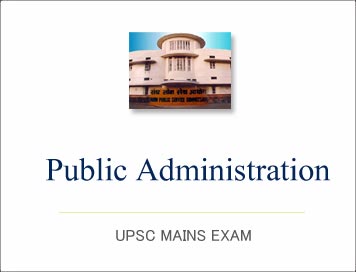(Exam Paper) UPSC IAS Mains 2004: Public Administration
(Exam Paper) UPSC IAS Mains 2004: Public Administration
Paper- I
Section A
1. Answer any THREE of the following questions in not more than 200 words each:
(a) “Bureaucracy can exist only where the whole service of the state is
removed from the common political life of the people, its chiefs as well as rank
and file. Its motives, its objectives, its policy, its standards must be
bureaucratic.” - Discuss.
(b) “Motivation theory is not synonymous with behaviour theory. The motivations
are only one class of determinants of behaviour while behaviour is almost always
motivated, it is also almost always biologically, culturally and situationally
determined as well.” Comment.
(c) Delegated Legislation is not absolute. Explain.
(d) Public Policy is not an independent variable and human history shows little
evidence of systematic learning from policy experience. Discuss.
2. Democracy and rood governance are contradictions in terms. Discuss with examples.
3. Weber’s ideas of impersonal detachment and esprit de corps are incompatible. Explain.
4. Discuss the legal and political implications of Right to information. Is it a feasible concept in the developing countries ?
Section B
5. Answer any THREE of the following questions in not more than 200 words each:
(a) Policy is a decision driven model of research use. Explain.
(b) Civil Service neutrality is a thing of the Past. Discuss.
(c) Recruitment is the backbone of Public Administration. Explain.
(d) The administrator needs autonomy and discretion in much the same way as the
politician needs control and intervention. Discuss.
6. What is Information Technology ? Describe its impact on Public Administration.
7. Explain the meaning, significance and Models of Comparative Public Administration.
8. Describe the changing profile of Development Administration and identify its efforts towards people’s empowerment.
Paper- II
Section A
1. Comment on any THREE of the following in not more than 200 words each:
(a) “The main features of British governmental and administrative system
continue to influence the present Administrative System.”
(b) “The National Human Rights Commission is unable to play its role effectively
due to various hindrances.”
(c) “Presidents of India prior to the passage of 42°” and 44" amendment could
afford to be more assertive.”
(d) “The highly significant and elevated position of Chief Secretary is
significantly undermined in practice to-day.”
2. “The position of Governors towards exercising their discretion and powers has considerably changed after 1967.” Discuss.
3.
(a) “The district officer as a chief agent and representative of state serves
as a channel of communication between the Government and the residents of the
district.” Explain.
(b) “In the context of liberalisation the role of Public Sector and its
welfarist approach is being drastically changed.” Elucidate.
4. “The special development programmes taken up for poverty alleviation with a hope that benefits of these programmes may reach to the people living below poverty line - have utterly failed to achieve its objectives.” Comment.
Section B
5. Comment on any THREE of the following in not more than 200 words each:
(a) The Estimates Committee is a continuous economy committee’.”
(b) “Values, more than techniques are the eventual determinants of the actions
of the administrators.”
(c) “National Development Council was established to co-ordinate between Union
government, the Planning Commission and the State governments.”
(d) “Criminalisation of politics has been responsible for the problems related
to law and order in our nation.”
6. “Welfare of the people has been a constitutional and legal obligation of the state, wherein both the Centre and State Governments are required to discharge the obligation within available resources.” Does this stand true in the context of globalization ?
7.
(a) “In spite of valuable suggestions through Administrative Reforms, still
we have not been able to come up to the expectations of the people.” Discuss.
(b) “Effective implementation of plan projects has been the weakest link in the
chain of the entire planning programme.” Elucidate.
8. “One of the greatest weakness inherent in a Federal polity is the possibility of conflict of loyalty and responsibility on the part of public servants as between Central and State Governments.” - Elaborate and comment.


